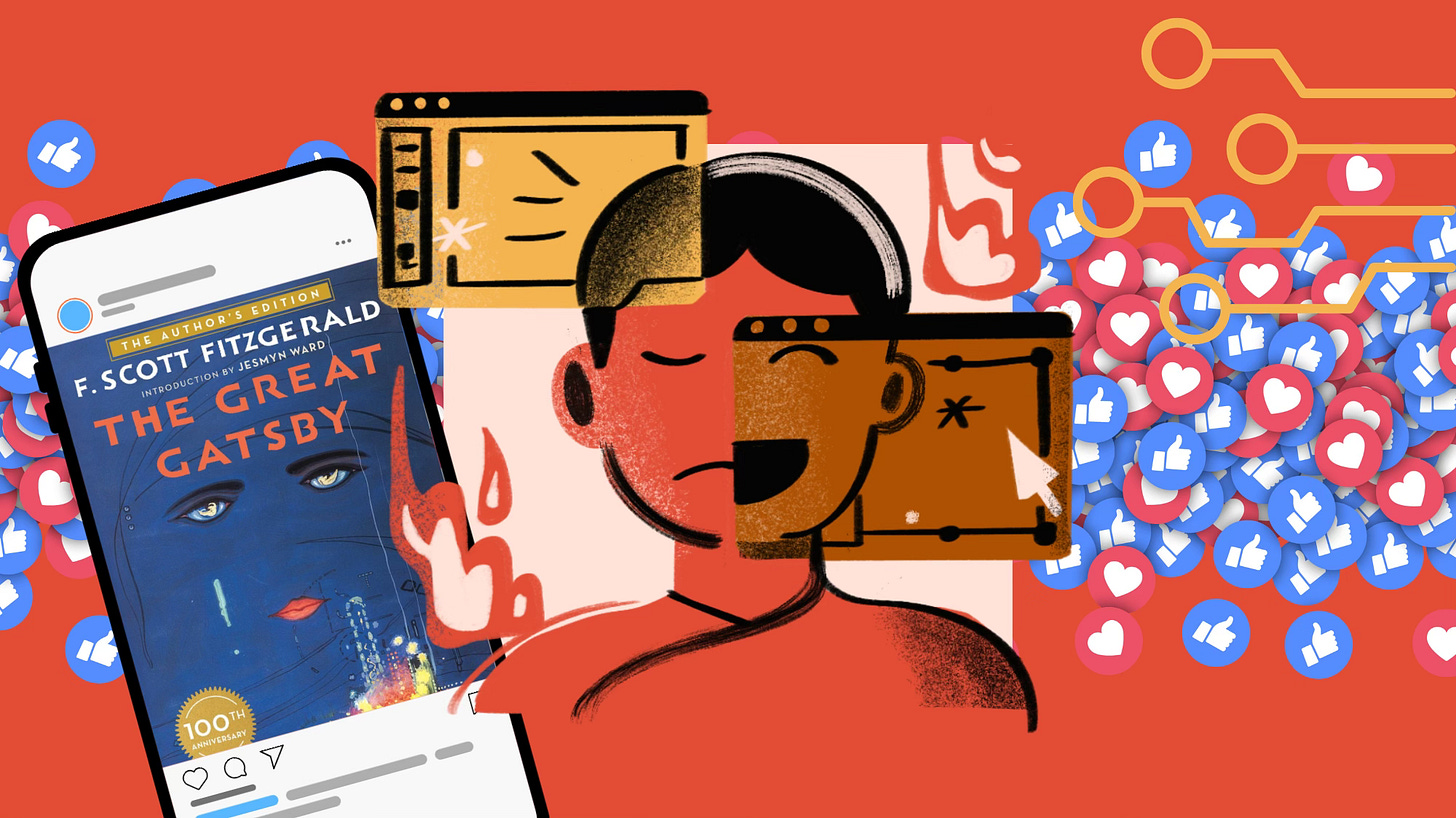Gatsby Had Jazz. We Have Algorithms.
The Great Gatsby Turns 100, and We’re Still Partying Through the Apocalypse
One hundred years ago, F. Scott Fitzgerald gave us The Great Gatsby—a novel about vibes, wealth, disillusionment, and the world’s most exhausting situationship. Also one of the only books I actually read in high school. Not just skimmed for quotes or read the SparkNotes—read. Like, cover to cover. And twice. So of course I had to read it again to celebrate its centennial.
And honestly, all these years later it still hits. Not just because Jay Gatsby is the original softboi-influencer-hustler hybrid, but because the world he built—glittering, fake, and kind of rotting inside—looks suspiciously like the one we’re living in now. Only our champagne is flat, our parties are digital, and the only thing more unstable than Daisy Buchanan is the stock market.
Gatsby was escaping reality. So are we. The only difference is we do it with Wi-Fi.
Welcome to the Algorithm Age, where your identity is a content strategy, your “dream life” is something you assemble from Pinterest boards and Instagram grids, and your main source of comfort is a three-minute TikTok about trauma bonding set to a sped-up Lana Del Rey remix.
Gatsby threw wild parties to attract one woman. We post thirst traps to attract one person and accidentally go viral with the wrong audience. The point is: nothing has changed. We’re still performing for people who aren’t looking.
The Roaring Twenties were messy, loud, and aesthetically pleasing. But they were also post-pandemic, post-war, and deeply unequal. Today, we’re doing the same dance—burnt out, overstimulated, and distracting ourselves with microtrends, escapist TV, and aesthetic TikToks touring the upscale apartments in New York City.
Instead of jazz, we have Apple Music algorithms. Instead of flappers, we have people romanticizing smoking cigarettes on fire escapes while texting their therapist. We are so back, and we are so not okay.
Like Gatsby, we are obsessed with reinvention. We build identities from scratch, update them quarterly, and pray the algorithm treats us kindly. Gatsby wanted to transcend class. We just want to survive capitalism long enough to pay off our credit cards and student debt—and maybe afford healthcare without breaking the bank.
Gatsby had the green light across the bay. We have follower counts, curated aesthetics, and the soft promise of a better life if we just get the algorithm right. That light never gets closer. The goalposts move. It’s the American Dream with filters and burnout.
And while we’re busy pretending everything’s fine, the modern-day Valley of Ashes is growing—rising rents, collapsing healthcare systems, climate doom, genocide, and billionaires playing Hunger Games in space. Fitzgerald gave us the eyes of Dr. T. J. Eckleburg watching over the decay. We have doomscrolling on social media and group chats.
Let’s be real: escapism is the only way a lot of us are making it through. But even that’s been commodified. “Romanticizing your life” has become an entire sub-industry. Want to feel something? Buy a beige linen dress, light a candle, and pretend your anxiety isn’t generational. Clean your apartment like you’re in a Studio Ghibli film. Drink water like it’s a narrative arc. It’s cute. It also doesn’t change anything.
Because the dream is broken. It’s always been broken. Gatsby built himself from scratch to gain access to a world that never wanted him. We do the same—rebrand, hustle, filter, overwork—just to find out that no amount of effort guarantees stability. Or joy. Or even decent Wi-Fi.
So why does Gatsby still matter, a 100 years later? Because we’re still those people—dancing, posting, spiraling, chasing things that never loved us back. Because reinvention still feels like survival. Because we’re still being told to dream big in a system designed to keep most of us small. And because deep down, we know that no matter how good the party looks, there’s always a hangover coming.
Gatsby died chasing a fantasy. We’re just trying to keep the dream from turning into a cautionary tale. Again.
But hey—at least our green light glows in 4K.






Sad, obnoxious, painful (albeit beautifully written) truth